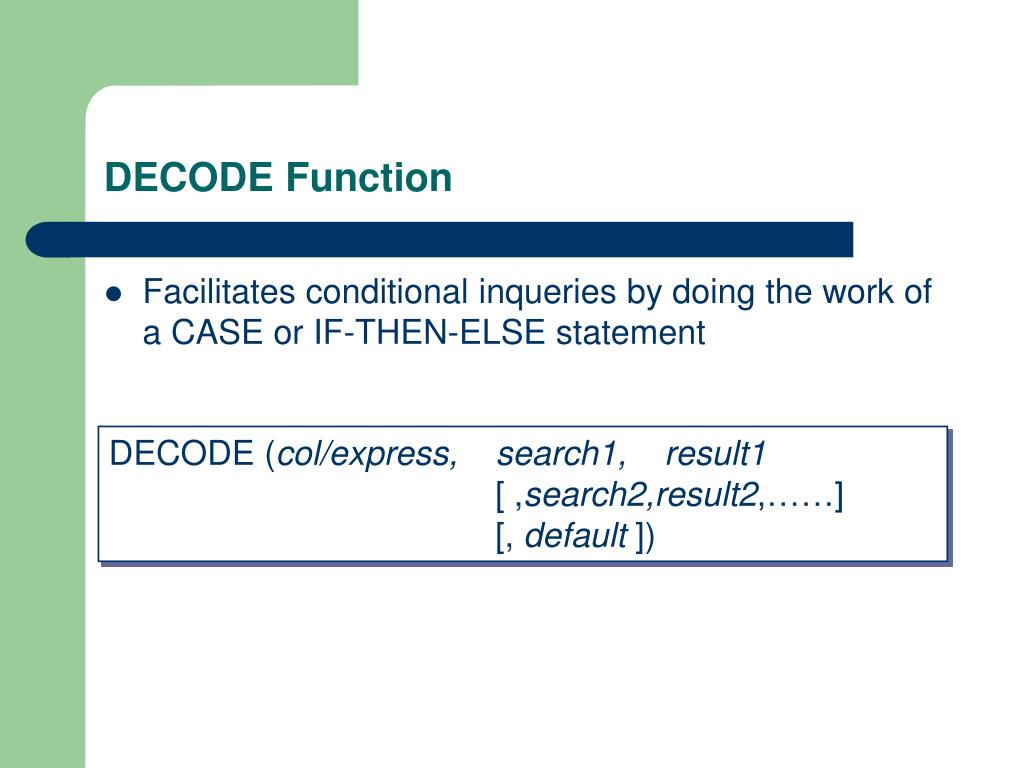
In addition the buffer size should be less than 64 (the built-in package adds newlines at that point) and must be evenly divided by 4. If there are newlines present the result will most likely be garbage. The functions expect the base64 payload to have no newlines, as that is how it is passed down from BPEL. There are a few important points about this.

If you have the query working using a CASE statement then why try to get it to work using a DECODE If it's a problem of getting it to work with PL/SQL then just use dynamic SQL. Doing ranges seems to be better handled with CASE statements.
#Oracle plsql decode pdf#
Length of BLOB : 74018 The PDF/BLOB generated from Q2 does not open in a PDF viewer. In my experience, decode is good for getting one value to be replaced with another (a decode).
V_buffer_varchar := utl_raw.cast_to_varchar2(v_buffer_raw) ĭbms_lob.writeappend(v_clob, length(v_buffer_varchar), v_buffer_varchar) Q2: select dbmslob.getlength (base64decode (base64encode (filedata))) from fndlobs where fileidV_buffer_raw := utl_encode.base64_encode(v_buffer_raw) search is the value that is compared against expression. The syntax for the decode function is: decode ( expression, search, result, search, result, default ) expression is the value to compare. ceil(dbms_lob.getlength(p_blob_in) / v_chunk_size) loopĭbms_lob.read(p_blob_in, v_chunk_size, v_offset, v_buffer_raw) In Oracle/PLSQL, the decode function has the functionality of an IF-THEN-ELSE statement. V_chunk_size binary_integer := (48 / 4) * 3 įor i in 1.

V_buffer_raw := utl_encode.base64_decode(v_buffer_raw) ĭbms_lob.writeappend(v_blob, utl_raw.length(v_buffer_raw), v_buffer_raw) įunction encode_base64(p_blob_in in blob) return clob is V_buffer_raw := utl_raw.cast_to_raw(v_buffer_varchar) ceil(dbms_lob.getlength(p_clob_in) / v_buffer_size) loopĭbms_lob.read(p_clob_in, v_buffer_size, v_offset, v_buffer_varchar) The implementation is a bit more involved: create or replace package body utl_base64 isįunction decode_base64(p_clob_in in clob) return blob isįor i in 1.

The package contains two functions: create or replace package utl_base64 isįunction decode_base64(p_clob_in in clob) return blob įunction encode_base64(p_blob_in in blob) return clob I wrote a function solving the specific problem for the customer, but then decided to write a more complete solution at home. I searched a bit, but while I got a few pointers I found no complete code. SQL> SELECT id, DECODE (col1, NULL, 'ZERO', col1) AS output FROM nulltesttab ORDER BY id ID OUTPUT - 1 ONE 2 ZERO 3 ZERO 4 ZERO 4 rows selected. DECODE compares the expression to each search value one by one. Unfortunately the built-in package supports only regular types, not lobs. DECODE The DECODE function is not specifically for handling null values, but it can be used in a similar way to the NVL function, as shown by the following example. In Oracle, DECODE function allows us to add procedural if-then-else logic to the query. I recently needed to decode large base64 payloads in Oracle 10g and save the resulting blobs in a table.


 0 kommentar(er)
0 kommentar(er)
